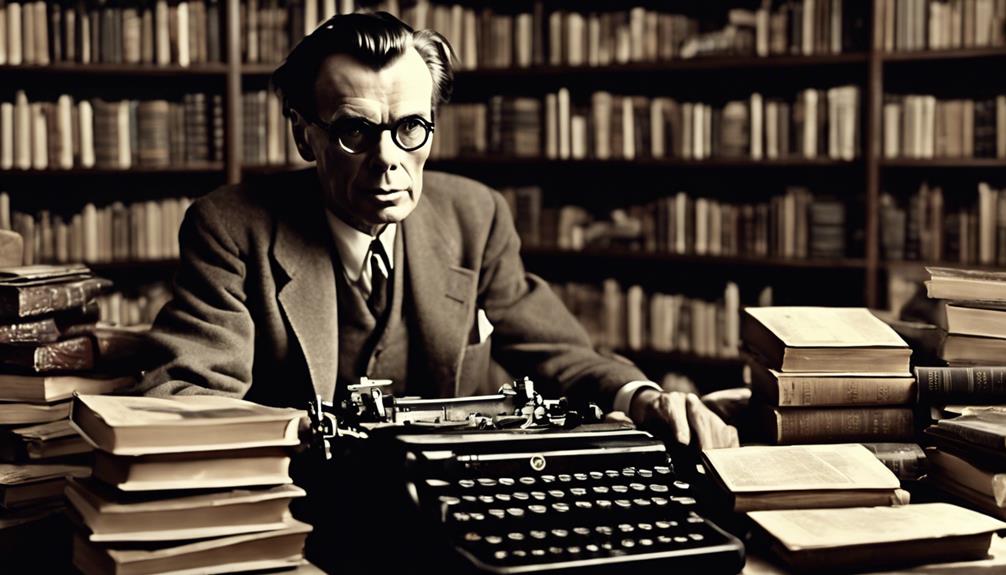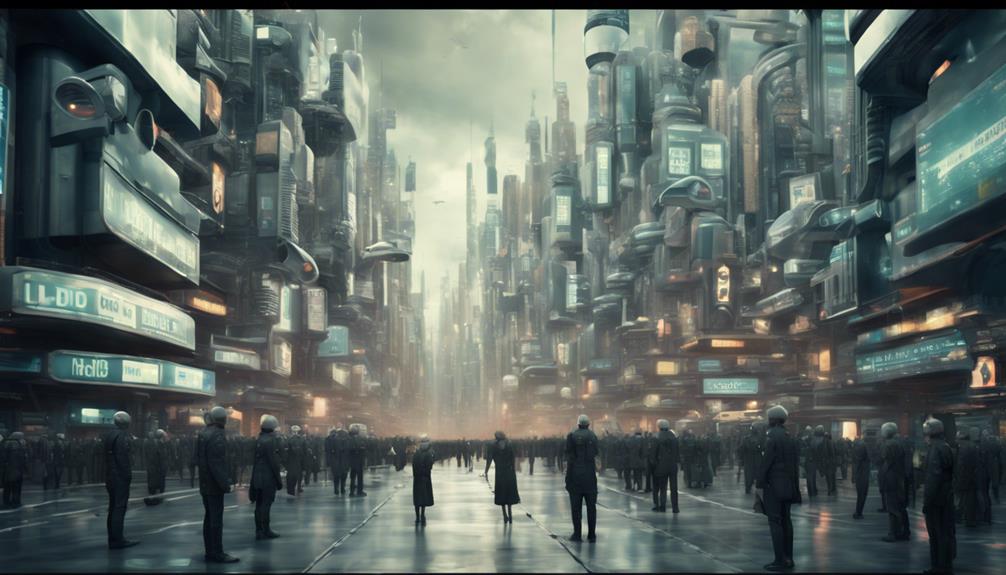Step into the world of Aldous Huxley, the brilliant mind who penned 'Brave New World,' a thought-provoking dystopian classic. From his upbringing in an intellectual family to his literary career shaped by societal themes and influences from notable writers like Wells, Huxley's journey is enthralling. His masterpiece challenged utopian ideals, exploring themes of technology, conditioning, and individuality. Despite controversies, the novel's enduring relevance continues to spark discussions on freedom, happiness, and societal norms. Huxley's legacy in literature and philosophy resonates in conversations on societal control and the future of humanity, hinting at deeper insights waiting to be discovered.
Early Life and Education
Aldous Huxley's early life and education greatly influenced his intellectual development and literary career. Born in 1894 in Surrey, England, Huxley grew up in a family deeply rooted in intellect and artistry, with a grandfather and brother who were notable figures in the fields of biology and science.
His educational journey led him to Eton College and later to Balliol College, Oxford, where he explored the study of English literature. It was during this time that Huxley's exposure to both literature and science left a profound impact on his writing style. Drawing from a blend of philosophical ideas and scientific concepts, Huxley crafted his works with a unique perspective that set him apart in the literary world.
This fusion of his background in science and literature became the foundation for his most famous novel, 'Brave New World', and other influential pieces that showcased his innovative approach to storytelling.
Literary Career Beginnings
As you explore Aldous Huxley's literary career beginnings, you'll discover his early influences as a poet and the development of his unique writing style.
Huxley's journey from poetry to satirical novels like 'Crome Yellow' and 'Antic Hay' showcases his evolution as a writer.
This timeline of his literary growth sets the stage for the exploration of societal themes that would define his later works.
Early Writing Influences
In his early literary career beginnings, Aldous Huxley explored various forms of writing, including poetry and essays, before moving on to novels. His early works were markedly influenced by prominent literary figures like George Orwell, D. H. Lawrence, and T. S. Eliot.
Here are some key points regarding Huxley's early writing influences:
- Diverse Forms: Huxley's foray into poetry and essays allowed him to experiment with different styles and themes, laying the groundwork for his later novels.
- Satirical Recognition: Works such as 'Crome Yellow' and 'Antic Hay' showcased Huxley's early penchant for satire and wit, earning him recognition in literary circles.
- Philosophical and Social Commentary: Huxley's interest in exploring philosophical and social issues became evident in his early writings, reflecting his contemplative nature.
- European Experiences: Exposure to European culture and interactions with notable literary figures during his travels played a pivotal role in shaping Huxley's early literary development.
Literary Development Timeline
Exploring various literary forms, Aldous Huxley initiated his literary career by delving into poetry and essays before shifting to novel writing. In 1916, Huxley published his first collection of poems, 'The Burning Wheel,' marking the beginning of his foray into the world of literature.
Progressing to novels in the 1920s, Huxley's works like 'Crome Yellow' (1921) and 'Antic Hay' (1923) showcased his satirical prowess and social commentary, laying the foundation for his later exploration of dystopian themes.
Throughout his literary development, Huxley demonstrated a keen interest in challenging societal norms and delving into the complexities of human behavior. By the time he penned 'Brave New World' in 1931, he'd already established himself as a prolific writer unafraid to push the boundaries of conventional thinking.
The success of 'Brave New World' solidified Aldous Huxley's reputation as a visionary author who fearlessly examined the darker facets of human society through his compelling narratives.
Influences and Inspirations

You'll find that Huxley's writing of 'Brave New World' was heavily influenced by his desire to parody the optimistic utopian works of H. G. Wells. Wells' vision of utopia served as a contrasting backdrop for Huxley's dystopian masterpiece.
Additionally, the scientific futurism within the novel was inspired by J. B. S. Haldane's work and the societal context of the Great Depression in Britain.
Huxley's Parody of Utopia
Aldous Huxley's satirical take on utopia in 'Brave New World' was deeply influenced by the pessimistic visions of his contemporaries. Here are some key influences and inspirations that shaped Huxley's parody of utopia:
- Contrasting Utopian Novels: Huxley diverged from the traditional utopian narrative, presenting a dystopian society in 'Brave New World,' challenging the optimistic views of authors like Wells.
- Influence of H. G. Wells: Inspired by Wells' works like 'A Modern Utopia' and 'Men Like Gods,' Huxley crafted a futuristic world that served as a cautionary tale rather than a vision of perfection.
- Scientific Futurism: Drawing from J. B. S. Haldane's 'Daedalus,' Huxley incorporated scientific advancements into his narrative, reflecting the societal anxieties of his time during the Great Depression.
- Satirical Naming: Characters such as Mustapha Mond were named after real-life figures like Sir Alfred Mond, adding satirical layers and critiquing the power structures in the novel.
Wells' Influence on Huxley
Huxley drew significant inspiration from H. G. Wells' utopian novels, such as 'A Modern Utopia' and 'Men Like Gods,' shaping the satirical tone of 'Brave New World.'
Contrasting with Wells' optimistic portrayals, Huxley used parody to critique the idealized visions of society found in Wells' works. This influence is evident in Huxley's portrayal of a dystopian future where societal control and conditioning take precedence over individual freedoms, a stark departure from Wells' utopian ideals.
The scientific futurism depicted in 'Brave New World' was also influenced by J. B. S. Haldane's 'Daedalus,' adding a layer of technological critique to the narrative.
Additionally, the novel's response to the Great Depression in Britain in 1931 reflects Huxley's commentary on the social and economic challenges of his time, further solidifying the impact of external events on his literary creation.
Scientific Futurism Inspiration
Drawing on diverse sources for inspiration, the scientific futurism in 'Brave New World' reflects Aldous Huxley's intricate web of influences and inspirations.
Aldous Huxley found inspiration in J. B. S. Haldane's 'Daedalus' for the scientific framework of his dystopian future world, where technology and genetic engineering play a central role.
Influenced by H. G. Wells' utopian works such as 'A Modern Utopia' and 'Men Like Gods,' Huxley crafted a contrasting and cautionary tale that explored the dark side of a seemingly perfect society.
The backdrop of the Great Depression in Britain in 1931 added a layer of realism to Huxley's vision, shaping the societal and economic themes woven into 'Brave New World.'
Through characters like the World Controller, Mustapha Mond, named after the industrialist Sir Alfred Mond, Huxley pays homage to real-life figures while infusing his narrative with a sense of familiarity and foreboding.
Writing 'Brave New World'
Crafting 'Brave New World' in the summer of 1931, Aldous Huxley embarked on a journey to create a dystopian masterpiece that would challenge the prevailing utopian narratives of his era. Immersed in a futuristic society under the World State's reign, Huxley painted a chilling picture of a world where scientific advancements had stripped away individuality and freedom.
Within this controlled world, World State citizens were conditioned from birth to conform and obey, highlighting Huxley's concerns about the dangers of a society driven solely by technological progress. Inspired by the utopian works of H. G. Wells and the scientific futurism of J. B. S. Haldane, Huxley explored the darker side of a world shaped by advancements in science and technology.
Through characters like Mustapha Mond, named after real-life influencers, Huxley weaved a narrative that questioned the implications of unchecked progress and the cost of sacrificing human values in the pursuit of a perfect society.
Themes and Social Commentary

Exploring key themes and societal critique, 'Brave New World' by Aldous Huxley delves into the consequences of unchecked technological progress and societal control. In this dystopian novel, Huxley presents a thought-provoking reflection on the dangers of totalitarianism and the loss of individuality in a world driven by genetic engineering and social conditioning.
- Totalitarianism Critique: Huxley criticizes totalitarian regimes by portraying a society where individual freedoms are suppressed in the name of stability and happiness.
- Individuality Exploration: Through characters like Bernard and John, the novel highlights the struggle for individuality against a conformist society, emphasizing the importance of free will.
- Genetic Engineering Ethical Dilemmas: The ethical implications of genetic engineering are examined, raising questions about the manipulation of human nature and the boundaries of science.
- Societal Control Commentary: Huxley's social commentary on societal control challenges readers to reflect on the impact of technology and conditioning on personal autonomy and human values.
Reception and Controversies
'Brave New World' by Aldous Huxley sparked heated debates and faced significant backlash upon its release in 1932. The novel's portrayal of promiscuity, self-harm, and challenging societal norms stirred controversy among readers and critics alike.
Huxley's exploration of a dystopian world where conformity and instant gratification reign supreme didn't sit well with many at the time. As a result, 'Brave New World' was banned and faced numerous challenges, reflecting the discomfort it evoked in society.
Despite the initial negative reception, the book has stood the test of time, continuing to provoke discussions on happiness, freedom, and the values that underpin our societies. Huxley's work remains a touchstone for those examining the boundaries of societal norms and the consequences of unchecked technological advancement.
Its enduring relevance underscores the power of literature to challenge and reshape our understanding of the world.
Legacy and Impact

Analyzing the enduring influence of Aldous Huxley's 'Brave New World' reveals its profound impact on societal discourse and ethical considerations. Huxley's exploration of societal control, individual freedom, and genetic engineering continues to shape conversations and reflections on the future of humanity.
- *Legacy*: Aldous Huxley's 'Brave New World' has left a lasting legacy in literature and philosophy, inspiring numerous works that delve into dystopian themes.
- *Impact on Societal Control*: The novel's stark portrayal of a society where individuality is suppressed in favor of conformity prompts discussions on the dangers of excessive societal control.
- *Ethical Considerations on Genetic Engineering*: Huxley's depiction of a world where genetic manipulation is rampant raises ethical questions about the boundaries of scientific advancement and the implications for humanity.
- *Emphasis on Individual Freedom*: Through characters like Bernard Marx and John, 'Brave New World' underscores the importance of preserving individual freedom and resisting oppressive systems.
Personal Life and Later Years
During his later years, Aldous Huxley resided in California, where he explored mysticism and experimented with psychedelics, shaping his writing and philosophical outlook.
Moving to California in 1937 amid concerns about European politics, Huxley delved into the domains of altered states of consciousness and spirituality. His experimentation with psychedelics influenced his work significantly, culminating in the renowned essay collection 'The Doors of Perception.'
Despite his focus on mysticism and spiritual themes, Huxley faced a personal challenge when he was diagnosed with laryngeal cancer in 1960. Tragically, he passed away on November 22, 1963, the same day as President Kennedy's assassination.
Throughout his later years, Huxley's exploration of mysticism and psychedelics not only shaped his writing but also left a lasting impact on the counterculture movement of the 1960s. His legacy encompasses a unique blend of literature, philosophical thought, and a deep personal journey into the realms of consciousness and spirituality.
Conclusion
So there you have it – the fascinating story of Aldous Huxley, the brilliant mind behind 'Brave New World'.
Through his insightful writing and thought-provoking themes, he left a lasting impact on literature and society.
As the saying goes, 'The pen is mightier than the sword,' and Huxley's words continue to resonate with readers around the world, challenging us to think critically about the world we live in.



